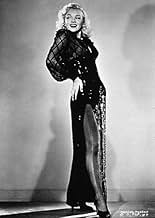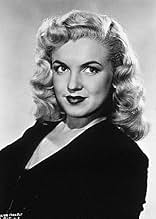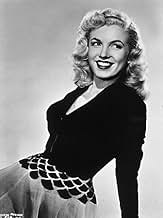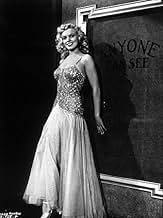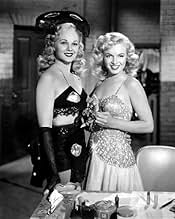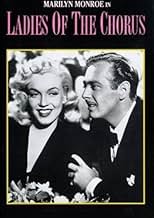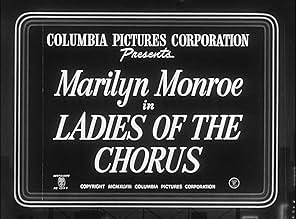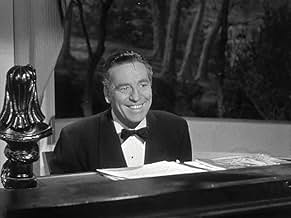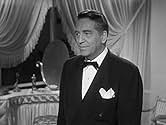AVALIAÇÃO DA IMDb
6,1/10
1,7 mil
SUA AVALIAÇÃO
Uma corista se apaixona por um jovem rico, mas o relacionamento deles é ameaçado pelos medos de sua mãe sobre a reação da família dele.Uma corista se apaixona por um jovem rico, mas o relacionamento deles é ameaçado pelos medos de sua mãe sobre a reação da família dele.Uma corista se apaixona por um jovem rico, mas o relacionamento deles é ameaçado pelos medos de sua mãe sobre a reação da família dele.
- Direção
- Roteiristas
- Artistas
Dave Barry
- Ripple the Decorator
- (não creditado)
Gladys Blake
- Flower Shop Girl
- (não creditado)
Chet Brandenburg
- Audience Member
- (não creditado)
Paul E. Burns
- Mr. Craig - Stage Doorman
- (não creditado)
Robert Clarke
- Peter Winthrop
- (não creditado)
James Conaty
- Party Guest
- (não creditado)
Oliver Cross
- Party Guest
- (não creditado)
Jay Eaton
- Party Guest
- (não creditado)
Bill Edwards
- Alan Wakely - Mae's Ex-husband
- (não creditado)
Ella Ethridge
- Party Guest
- (não creditado)
Adolph Faylauer
- Burlesque Show Spectator
- (não creditado)
Avaliações em destaque
The plot explores the idea of being accepted as a chorus girl. Will the upper class set acknowledge such a lowlife species? The story is trivial but holds an interest as Marilyn Monroe (Peggy) carries herself well in one of her early entries. Thankfully, we see her deliver her lines without that irritating baby-talk that became her trademark. She talks properly in this film! So, it's a treasure if only for that.
There is a good segment where Adele Jurgens (Mae) shows off some dance moves – probably the best moment of the film. The music is OK, Marilyn Monroe sings a couple of songs, but nothing too special.
The flimsy story wraps itself up over the course of an hour, but we watch it for Marilyn Monroe.
There is a good segment where Adele Jurgens (Mae) shows off some dance moves – probably the best moment of the film. The music is OK, Marilyn Monroe sings a couple of songs, but nothing too special.
The flimsy story wraps itself up over the course of an hour, but we watch it for Marilyn Monroe.
A very young Marilyn Monroe in her first lead role made an impression on critics with her performance in this light film about a young burlesque queen whose mother disapproves of her engagement to a wealthy man.
Monroe's sweet singing voice is showcased for the first time in this film, and it is a real treat. She had not yet adopted the "Marilyn Monroe" persona, but even without the breathy baby-doll voice she is the image of innocent seduction.
Although the plot is rather formulaic and simplistic, this film does offer something of a twist at the end. All in all a cute film and opportunity to see Monroe as a young fresh-faced beauty who, as always, lights up the screen.
Monroe's sweet singing voice is showcased for the first time in this film, and it is a real treat. She had not yet adopted the "Marilyn Monroe" persona, but even without the breathy baby-doll voice she is the image of innocent seduction.
Although the plot is rather formulaic and simplistic, this film does offer something of a twist at the end. All in all a cute film and opportunity to see Monroe as a young fresh-faced beauty who, as always, lights up the screen.
LADIES OF THE CHORUS (Columbia, 1948), directed by Phil Karlson, stars Adele Jergens, resident performer for Columbia, and Marilyn Monroe, newcomer to motion pictures in her first major movie role. Basically a dress rehearsal for young Monroe, stardom and legendary status did not come to her immediately with this 61 minute program musical, yet it was a start to what's to soon come in the 1950s over at 20th Century- Fox.
The ladies of the chorus happen to be May Martin (Adele Jergens), a former burlesque queen now dancing in the chorus with other much younger girls, one of them being her beautiful blonde daughter named Peggy (Marilyn Monroe). Peggy resents her mother's over protectiveness when wanting to go with Bubbles LaRue (Marjorie Hoshelle) for a night on the town after the show, but May lives only for her daughter's happiness, knowing full well that Bubbles is not the sort of person Peggy should befriend. After Bubbles quits the show on opening night, Joe (Frank Scannell), the stage manager, hires May to take her place. May has other plans. She has Peggy go on in her place. Peggy becomes a sensation as the new "burlesque queen." Her rise to fame at the Rome Theater soon attracts the attention of Randy Carroll (Rand Brooks), a wealthy young man, who anonymously sends her orchids on a daily basis. After Peggy gets to meet her new admirer at the flower shop, she becomes fascinated by him, enough to have dates and dinner before accepting his marriage proposal. Upon meeting with Peggy's mother, she results her feelings about her daughter's engagement by telling Randy via flashback her similar situation after marrying Al Wakefield (Bill Edwards), Peggy's father, much to the dismay of her former partner, Billy McKay (Eddie Garr), the man she should have married instead. It was after the family discovered May was a burlesque queen that her marriage to Al was annulled. Randy is convinced that his mother, Adele (Nana Bryant) and her society friends, are not that way. During the engagement party at the Carroll estate do both mother and daughter come up with some unexpected results.
Had it not been for the fact that Marilyn Monroe (1926-1962) ever appeared in LADIES OF THE CHORUS, chances are this so-so story with forgettable songs might have vanished into some dark corner of a dusty film vault along with other forgettable Columbia programmers from this period. Because of Monroe's rise to stardom that took place in the 1950s, LADIES OF THE CHORUS was reissued into theaters, with opening credits changing Monroe's name over the title instead of Adele Jergens. The reissue print is the one that's been circulating on television, and used years later on both video cassette and DVD. The film itself would have been more believable as well as acceptable had Jergens played Monroe's older sister rather than her mother, considering how Jergens doesn't seem old enough to have a grown-up daughter, even without the blonde wig she uses to appear younger during the burlesque musical show sequences.
Songs by Allan Roberts and Lester Lee featured are: "Ladies of the Chorus" (sung by chorus during opening credits); "You Belong to Me," "Every Baby Needs a Da-Da Daddy," "You Belong to Me" (all sung by Marilyn Monroe); "I'm So Crazy for You" (sung by Adele Jergens); "The Ubangi Love Song" (performed by the Bobby True Trio); and "You're Never Too Old" (sung by Nana Bryant). While such a song as "Every Baby Needs a Da-Da Daddy" simplifies Monroe's musical style along with "You Belong to Me," somehow Nana Bryant steals the limelight with her rendition to "You're Never Too Young." Other acts incorporated into the story include a father and son bubble talking under water-type interior decorators, Hipple and Hipple Jr., played by Dave and Alan Barry; followed by the jive-singing by the Bobby True Trio at the Carroll home. Others in the cast include: Steven Geray (Salisbury, the Butler); Myron Healy )Tom Lawson); Gladys Blake (The Flower Shop Girl); and Almira Sessions (Woman at Engagement Party), among others.
Formerly shown on American Movie Classics cable channel prior to 2001, LADIES OF THE CHORUS has also become part of the film library of Turner Classic Movies dating back to its humble beginnings of 1994. Even though its basic theme could have been "You're Never Too Young," the movie itself is strictly "B" material with story-line resembling those early talkie musicals of the late 1920s. Regardless, it does offer curiosity and interest for anyone interested in viewing the youthful presence of Marilyn Monroe in her only movie for Columbia. (**)
The ladies of the chorus happen to be May Martin (Adele Jergens), a former burlesque queen now dancing in the chorus with other much younger girls, one of them being her beautiful blonde daughter named Peggy (Marilyn Monroe). Peggy resents her mother's over protectiveness when wanting to go with Bubbles LaRue (Marjorie Hoshelle) for a night on the town after the show, but May lives only for her daughter's happiness, knowing full well that Bubbles is not the sort of person Peggy should befriend. After Bubbles quits the show on opening night, Joe (Frank Scannell), the stage manager, hires May to take her place. May has other plans. She has Peggy go on in her place. Peggy becomes a sensation as the new "burlesque queen." Her rise to fame at the Rome Theater soon attracts the attention of Randy Carroll (Rand Brooks), a wealthy young man, who anonymously sends her orchids on a daily basis. After Peggy gets to meet her new admirer at the flower shop, she becomes fascinated by him, enough to have dates and dinner before accepting his marriage proposal. Upon meeting with Peggy's mother, she results her feelings about her daughter's engagement by telling Randy via flashback her similar situation after marrying Al Wakefield (Bill Edwards), Peggy's father, much to the dismay of her former partner, Billy McKay (Eddie Garr), the man she should have married instead. It was after the family discovered May was a burlesque queen that her marriage to Al was annulled. Randy is convinced that his mother, Adele (Nana Bryant) and her society friends, are not that way. During the engagement party at the Carroll estate do both mother and daughter come up with some unexpected results.
Had it not been for the fact that Marilyn Monroe (1926-1962) ever appeared in LADIES OF THE CHORUS, chances are this so-so story with forgettable songs might have vanished into some dark corner of a dusty film vault along with other forgettable Columbia programmers from this period. Because of Monroe's rise to stardom that took place in the 1950s, LADIES OF THE CHORUS was reissued into theaters, with opening credits changing Monroe's name over the title instead of Adele Jergens. The reissue print is the one that's been circulating on television, and used years later on both video cassette and DVD. The film itself would have been more believable as well as acceptable had Jergens played Monroe's older sister rather than her mother, considering how Jergens doesn't seem old enough to have a grown-up daughter, even without the blonde wig she uses to appear younger during the burlesque musical show sequences.
Songs by Allan Roberts and Lester Lee featured are: "Ladies of the Chorus" (sung by chorus during opening credits); "You Belong to Me," "Every Baby Needs a Da-Da Daddy," "You Belong to Me" (all sung by Marilyn Monroe); "I'm So Crazy for You" (sung by Adele Jergens); "The Ubangi Love Song" (performed by the Bobby True Trio); and "You're Never Too Old" (sung by Nana Bryant). While such a song as "Every Baby Needs a Da-Da Daddy" simplifies Monroe's musical style along with "You Belong to Me," somehow Nana Bryant steals the limelight with her rendition to "You're Never Too Young." Other acts incorporated into the story include a father and son bubble talking under water-type interior decorators, Hipple and Hipple Jr., played by Dave and Alan Barry; followed by the jive-singing by the Bobby True Trio at the Carroll home. Others in the cast include: Steven Geray (Salisbury, the Butler); Myron Healy )Tom Lawson); Gladys Blake (The Flower Shop Girl); and Almira Sessions (Woman at Engagement Party), among others.
Formerly shown on American Movie Classics cable channel prior to 2001, LADIES OF THE CHORUS has also become part of the film library of Turner Classic Movies dating back to its humble beginnings of 1994. Even though its basic theme could have been "You're Never Too Young," the movie itself is strictly "B" material with story-line resembling those early talkie musicals of the late 1920s. Regardless, it does offer curiosity and interest for anyone interested in viewing the youthful presence of Marilyn Monroe in her only movie for Columbia. (**)
Like most folks I tuned in to catch Monroe in her first featured role. Being a Columbia quickie (filmed in 10-days), I wasn't expecting much outside of the luscious blonde. So I was rather happily surprised that the 60-minutes turned out better than I expected. The first part features nicely staged burlesque bits, along with good snappy backstage dialog. The second part has Monroe and fiancé (Brooks) having to confront his family's apparent uptown snobbery. After all, Monroe does play a burly-que queen, not exactly the Manhattan Social Register. I like the way the ending's surprisingly finessed.
It's a fine cast with scrappy Jergens doing well considering she has to play Monroe's mother, of all things. Kudos too to Bryant as Brooks's uptown mom, though actor Brooks seems pretty colorless which maybe he was supposed to be. Anyway, the famously skittish Monroe appears utterly relaxed and glowing in her role. Musical numbers, I think, always brought out the best in her. Also, this is before super- stardom began to weigh her down. Should also note that director Karlson shows his versatility here since his specialty otherwise was tough, tight crime dramas.
All in all, the little flick can be enjoyed on its own merits or as an early peek at perhaps Hollywood's most legendary actress.
It's a fine cast with scrappy Jergens doing well considering she has to play Monroe's mother, of all things. Kudos too to Bryant as Brooks's uptown mom, though actor Brooks seems pretty colorless which maybe he was supposed to be. Anyway, the famously skittish Monroe appears utterly relaxed and glowing in her role. Musical numbers, I think, always brought out the best in her. Also, this is before super- stardom began to weigh her down. Should also note that director Karlson shows his versatility here since his specialty otherwise was tough, tight crime dramas.
All in all, the little flick can be enjoyed on its own merits or as an early peek at perhaps Hollywood's most legendary actress.
LADIES OF THE CHORUS is a fairly rare "B" movie from 1948 of interest because it's Marilyn Monroe's very first starring film but beyond that it's a quite well-made little musical. Marilyn was a complete unknown at the time with only a little extra work and one credited bit part under her belt when she was cast in this movie and yet she's quite wonderful and a total pro.
Marilyn stars as Peggy, a very young burlesque chorus girl who works in the chorus alongside her fortyish mother Mae (Adele Jergens). When the obnoxious "star" of the show walks out, Peggy steps into her part and becomes a sensation, earning the interest of various back door johnnies, in particular wealthy heir Randy (Rand Brooks). Peggy and Randy fall in love and he proposes but Mae is wary that Peggy will never be accepted in his social circles from her own past experience with her own annulled marriage to a socially prominent young man decades ago. Mae makes Randy promise to tell his mother (Nana Bryant) that Peggy is a burlesque queen in advance of their visit to the family's Cleveland estate, which he fails to do.
Marilyn is just adorable in this film and sings two surprisingly good songs for a "B" movie, "Anyone Can See I Love You" and "Every Baby Needs a Da Da Daddy", the latter a sexy little number that foreshadows her classic "Diamonds are a Girl's Best Friend" in sexiness and philosophy, right down to a reference to Tiffanys. Columbia's resident B queen of the era Adele Jergens is negated to a subordinate role as her mother, as still shapely middle-aged dancer who hides her gray hair under a blonde wig. Adele does very well at suggesting a slightly tired woman a decade or so older than her actual age and also gives a very good performance. (Adele was top billed in the original 1948 release but it appears only copies from the 1952 reissue exist where Marilyn was given that spot).
Rand Brooks (best known as Scarlett O'Hara's first husband in GONE WITH THE WIND) is quite pleasant as Marilyn's romantic suitor (they have a lovely scene together parked in a car that is an endearing ode to wholesome young love) and character actress Nana Bryant gives a pleasant performance as his mother, complete with a musical number of her own, the memorable "You're Never Too Old". Standing out in good comic unbilled bits are Gladys Blake as a gossipy sales girl and Dave Barry as a garbled-speaking decorator.
Running just a minute over an hour, the movie moves so quickly there's really no time for dull spots. This movie was reissued in 1952 by Columbia at the dawn of Marilyn's stardom but was virtually unseen for decades thereafter (likely because it was too short for most television movie programming slots); it reemerged in 1994 on video and a few years later had a handful of showings on cable television. Today your best bet in seeing it would probably be in buying a used copy of the out-of-print VHS tape or, if your DVD player can handle it, the region 2 DVD release from the United Kingdom in a Marilyn Monroe boxed set.
Marilyn stars as Peggy, a very young burlesque chorus girl who works in the chorus alongside her fortyish mother Mae (Adele Jergens). When the obnoxious "star" of the show walks out, Peggy steps into her part and becomes a sensation, earning the interest of various back door johnnies, in particular wealthy heir Randy (Rand Brooks). Peggy and Randy fall in love and he proposes but Mae is wary that Peggy will never be accepted in his social circles from her own past experience with her own annulled marriage to a socially prominent young man decades ago. Mae makes Randy promise to tell his mother (Nana Bryant) that Peggy is a burlesque queen in advance of their visit to the family's Cleveland estate, which he fails to do.
Marilyn is just adorable in this film and sings two surprisingly good songs for a "B" movie, "Anyone Can See I Love You" and "Every Baby Needs a Da Da Daddy", the latter a sexy little number that foreshadows her classic "Diamonds are a Girl's Best Friend" in sexiness and philosophy, right down to a reference to Tiffanys. Columbia's resident B queen of the era Adele Jergens is negated to a subordinate role as her mother, as still shapely middle-aged dancer who hides her gray hair under a blonde wig. Adele does very well at suggesting a slightly tired woman a decade or so older than her actual age and also gives a very good performance. (Adele was top billed in the original 1948 release but it appears only copies from the 1952 reissue exist where Marilyn was given that spot).
Rand Brooks (best known as Scarlett O'Hara's first husband in GONE WITH THE WIND) is quite pleasant as Marilyn's romantic suitor (they have a lovely scene together parked in a car that is an endearing ode to wholesome young love) and character actress Nana Bryant gives a pleasant performance as his mother, complete with a musical number of her own, the memorable "You're Never Too Old". Standing out in good comic unbilled bits are Gladys Blake as a gossipy sales girl and Dave Barry as a garbled-speaking decorator.
Running just a minute over an hour, the movie moves so quickly there's really no time for dull spots. This movie was reissued in 1952 by Columbia at the dawn of Marilyn's stardom but was virtually unseen for decades thereafter (likely because it was too short for most television movie programming slots); it reemerged in 1994 on video and a few years later had a handful of showings on cable television. Today your best bet in seeing it would probably be in buying a used copy of the out-of-print VHS tape or, if your DVD player can handle it, the region 2 DVD release from the United Kingdom in a Marilyn Monroe boxed set.
Você sabia?
- CuriosidadesWhen the film was re-released in November 1952, Columbia redesigned the opening title credits with the name of Marilyn Monroe over the title, and the name of Adele Jergens, who originally had top billing, moved to the head of the supporting cast; this is the version that was shown on Turner Classic Movies.
- Erros de gravaçãoIn a flashback that takes place more than twenty years earlier, the women's hairstyles and clothes are those of 1948.
- Citações
Chorus Girl #3: He says to me, "I'd like to see your show, baby, how about a couple of passes?"
Chorus Girl #2: The nerve!
Chorus Girl #1: And the guys I go out with don't want passes. They just make 'em.
Chorus Girl #3: Speaking of passes, I've been knocking down so many lately, I feel like an All-American.
Principais escolhas
Faça login para avaliar e ver a lista de recomendações personalizadas
- How long is Ladies of the Chorus?Fornecido pela Alexa
Detalhes
- Data de lançamento
- País de origem
- Idioma
- Também conhecido como
- Ladies of the Chorus
- Locações de filme
- Empresa de produção
- Consulte mais créditos da empresa na IMDbPro
- Tempo de duração
- 1 h 1 min(61 min)
- Cor
- Proporção
- 1.37 : 1
Contribua para esta página
Sugerir uma alteração ou adicionar conteúdo ausente

